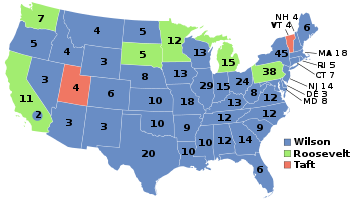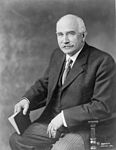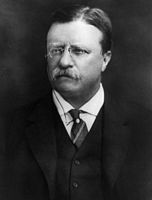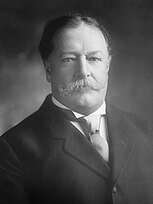Electoral history of Woodrow Wilson
This is the electoral history of Thomas Woodrow Wilson, a Democrat, who served as the 28th President of the United States (1913–1921), and earlier as the 34th Governor of New Jersey (1911–1913).
Wilson's electoral record is fairly short compared with most other American Presidents. Throughout his lifetime Wilson competed in only three public elections, winning all of them.
1910 New Jersey gubernatorial race[]

Candidates[]
Major party candidates
- Woodrow Wilson, Democratic
- Vivian M. Lewis, Republican
Other candidates
- Wilson B. Killingbeck, Socialist
- C. F. Repp, Prohibition Party
- John C. Butterworth, Socialist Labor Party of America
Results[]
| Party | Candidate | Votes | % | ±% | |
|---|---|---|---|---|---|
| Democratic | Woodrow Wilson | 233,682 | 53.93% | ||
| Republican | Vivian M. Lewis | 184,626 | 42.61% | ||
| Socialist | Wilson B. Killingbeck | 10,134 | 2.34% | ||
| Prohibition | C. F. Repp | 2,818 | 0.65% | ||
| Socialist Labor | John C. Butterworth | 2,032 | 0.47% | ||
| Majority | |||||
| Turnout | |||||
| Democratic gain from Republican | Swing | ||||
1912 Presidential Election[]
Democratic party nomination[]
| |||||||||||||||||||||||||||||||||||||||||
| |||||||||||||||||||||||||||||||||||||||||
 | |||||||||||||||||||||||||||||||||||||||||
| |||||||||||||||||||||||||||||||||||||||||
1912 Democratic Party presidential primaries[]
Wilson emerged the overall victor from the 12 Democratic Party caucuses and presidential primaries held in the lead up to the 1912 Democratic National Convention. The primary process was not what it is today however, most states did not hold primaries or caucuses and the party was not bound by the results in the way it is today.
The Democratic National Convention[]
The 1912 Democratic National Convention was one of the most protracted and contested in history. Wilson lost the first thirty ballots to House Speaker Champ Clark. Even though Clark secured a majority on the 9th Ballot, to be the party nominee, DNC rules at the time required at least two-thirds, so the voting continued. Wilson's chances steadily increased after he received the endorsement of William Jennings Bryant starting on the 10th Ballot. After initially trailing and almost giving up hope, Wilson finally prevailed on the 46th Ballot.[2]
General Election[]
In the general election, Wilson faced two major opponents: incumbent Republican President William Howard Taft, and former Republican President Theodore Roosevelt, running on the "Bull Moose" Party ticket. Eugene V. Debs was the Socialist Party candidate and attracted far from token support. At the 1912 Republican National Convention Taft narrowly won re-nomination against Roosevelt, under whom he had served as Vice President. Roosevelt felt he had been cheated by party bosses and along with his supporters walked out of the convention. This split proved as expected, to be a major boost for Democrats in the general election. Wilson went on to become the first Democrat victor in a presidential election since 1892.[3]
| |||||||||||||||||||||||||||||||||||||||||||||||||||||||||||||
531 members of the Electoral College 266 electoral votes needed to win | |||||||||||||||||||||||||||||||||||||||||||||||||||||||||||||
|---|---|---|---|---|---|---|---|---|---|---|---|---|---|---|---|---|---|---|---|---|---|---|---|---|---|---|---|---|---|---|---|---|---|---|---|---|---|---|---|---|---|---|---|---|---|---|---|---|---|---|---|---|---|---|---|---|---|---|---|---|---|
| Turnout | 58.8%[4] | ||||||||||||||||||||||||||||||||||||||||||||||||||||||||||||
| |||||||||||||||||||||||||||||||||||||||||||||||||||||||||||||
  Presidential election results map. Blue denotes those won by Wilson/Marshall, light green denotes those won by Roosevelt/Johnson, red denotes states won by Taft/Butler. Numbers indicate the number of electoral votes allotted to each state. | |||||||||||||||||||||||||||||||||||||||||||||||||||||||||||||
| |||||||||||||||||||||||||||||||||||||||||||||||||||||||||||||
Results[]
On November 5, Wilson captured the presidency handily by carrying a record 40 states.
As of 2022, this is the only presidential election since 1860 in which either 4 candidates received more than 5% of the popular vote or a third-party candidate outperformed a Republican or Democrat in the general election. Wilson won the presidency with a lower percentage of the popular vote than any candidate since Abraham Lincoln in 1860. Taft's result remains the worst performance for any incumbent president, both in terms of electoral votes (8) and share of popular votes (23.17%). His 8 electoral votes remain the fewest by a Republican or Democrat, matched by Alf Landon's 1936 campaign.[5]
Despite his clear victory in electoral college votes, Wilson's popular vote total was less than that of William Jennings Bryan, in any of his three preceding presidential campaigns as the Democratic Party's nominee for president.[6] In only two regions, New England and the Pacific, was Wilson's vote greater than the greatest Bryan vote.[7] Wilson won a plurality, not a majority of the popular vote. Wilson's popular vote percentage was lowest of any victor in a U.S. Presidential Election since Abraham Lincoln in 1860.
1916 Presidential Election[]
| |||||||||||||||||||||||||||||
531 members of the Electoral College 266 electoral votes needed to win | |||||||||||||||||||||||||||||
|---|---|---|---|---|---|---|---|---|---|---|---|---|---|---|---|---|---|---|---|---|---|---|---|---|---|---|---|---|---|
| Turnout | 61.6%[8] | ||||||||||||||||||||||||||||
| |||||||||||||||||||||||||||||
  Presidential election results map. Blue denotes those won by Wilson/Marshall, red denotes states won by Hughes/Fairbanks. Numbers indicate the number of electoral votes allotted to each state. | |||||||||||||||||||||||||||||
| |||||||||||||||||||||||||||||
In 1916, Wilson ran for re-election. After easily securing re-nomination at the Democratic Convention, Wilson went on to narrowly win the general election against Republican Charles Hughes.[9]
References[]
- ^ Incumbent vice-president James S. Sherman was re-nominated to serve as Taft's running-mate, but died six days prior to the election. Butler was chosen to receive the Republican vice-presidential votes after the election.
- ^ Kalb, Deborah, "Guide to U.S. Elections." Published December 2015. books.google.com/books?id=9CZECwAAQBAJ&pg=PA1715.
- ^ "Woodrow Wilson is Nominated for President; Gov. Marshall of Indiana for Vice President". The New York Times (July 3, 1912). partners.nytimes.com/library/politics/camp/120703convention-dem-ra.html. Retrieved March 9, 2021.
- ^ Cooper (2009), pp. 154–155
- ^ "Voter Turnout in Presidential Elections". The American Presidency Project. UC Santa Barbara.
- ^ "1936 Presidential General Election Data - National". Retrieved March 11, 2021.
- ^ The Presidential Vote, 1896–1932, Edgar E. Robinson, pg. 14
- ^ The Presidential Vote, 1896–1932, Edgar E. Robinson, pg. 15
- ^ "Voter Turnout in Presidential Elections". The American Presidency Project. UC Santa Barbara.
- ^ Leary, William M. (1967). "Woodrow Wilson, Irish Americans, and the Election of 1916". The Journal of American History. 54 (1): 57–72. doi:10.2307/1900319. JSTOR 1900319.
- Woodrow Wilson
- Electoral history of politicians from New Jersey











